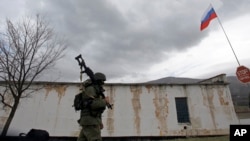BEIJING —
As the crisis in Ukraine unfolds with Russian military troops fanning out around Ukraine’s Crimean peninsula, Russian diplomats have asserted that China supports Russia’s actions there. Throughout this week China’s comments on the situation have been muted.
Qin Gang, China’s Foreign Ministry spokesperson, said China believes in non-interference in internal affairs and is taking into consideration historical facts as well as the complexity of the situation.
That statement contrasts one earlier this week from Russia's Foreign Ministry after the Russian and Chinese foreign ministers spoke by telephone. Russia said Moscow and Beijing had broadly coinciding views on the situation in Ukraine, implying that Russia had China’s support for its military actions in the country.
China’s Foreign Ministry, however, has said China respects the sovereignty and territorial integrity of Ukraine and that all parties should use dialogue and negotiation to preserve peace in the region.
Chinese news media coverage has been more pointed. In an editorial this week China’s Global Times newspaper stated that “the Ukrainian situation shows us clearly that in the international political arena, principles are decided by power.” In a commentary China’s Xinhua news agency argued that the West’s “biased mediation has polarized Ukraine and only made things worse in the country.”
Wang Dong, a professor of International Relations at Peking University, said conflicting views represented by the Chinese media and government are because China has much to lose and gain with the unfolding crisis in Ukraine.
“China also has a lot at stake involved because we also have business with Ukraine," Wang said.
In recent years Ukraine and China have formed military, trade and agricultural partnerships. In 2012 Ukraine became the fourth-largest arms exporter in the world, with many of those exports going to China. Beijing's first aircraft carrier, the Liaoning, was built in Ukraine.
Ukraine agreed last year to a deal for China to lease five percent of the country’s land to grow crops and raise pigs for sale to Chinese state-owned companies. As part of that deal China promised to build highways and bridges in the country.
China also pledged $8 billion in aid during ousted Ukrainian President Viktor Yanukovych’s visit to Beijing in December. That was in addition to $10 billion China had previously given to the country.
War in Ukraine would endanger China’s investments there, and China’s comments this week may be a delicate balance between offering some support for its neighbor, Russia, without directly backing military intervention from any side that could throw the region into more chaos.
Qin Gang, China’s Foreign Ministry spokesperson, said China believes in non-interference in internal affairs and is taking into consideration historical facts as well as the complexity of the situation.
That statement contrasts one earlier this week from Russia's Foreign Ministry after the Russian and Chinese foreign ministers spoke by telephone. Russia said Moscow and Beijing had broadly coinciding views on the situation in Ukraine, implying that Russia had China’s support for its military actions in the country.
China’s Foreign Ministry, however, has said China respects the sovereignty and territorial integrity of Ukraine and that all parties should use dialogue and negotiation to preserve peace in the region.
Chinese news media coverage has been more pointed. In an editorial this week China’s Global Times newspaper stated that “the Ukrainian situation shows us clearly that in the international political arena, principles are decided by power.” In a commentary China’s Xinhua news agency argued that the West’s “biased mediation has polarized Ukraine and only made things worse in the country.”
Wang Dong, a professor of International Relations at Peking University, said conflicting views represented by the Chinese media and government are because China has much to lose and gain with the unfolding crisis in Ukraine.
“China also has a lot at stake involved because we also have business with Ukraine," Wang said.
In recent years Ukraine and China have formed military, trade and agricultural partnerships. In 2012 Ukraine became the fourth-largest arms exporter in the world, with many of those exports going to China. Beijing's first aircraft carrier, the Liaoning, was built in Ukraine.
Ukraine agreed last year to a deal for China to lease five percent of the country’s land to grow crops and raise pigs for sale to Chinese state-owned companies. As part of that deal China promised to build highways and bridges in the country.
China also pledged $8 billion in aid during ousted Ukrainian President Viktor Yanukovych’s visit to Beijing in December. That was in addition to $10 billion China had previously given to the country.
War in Ukraine would endanger China’s investments there, and China’s comments this week may be a delicate balance between offering some support for its neighbor, Russia, without directly backing military intervention from any side that could throw the region into more chaos.




